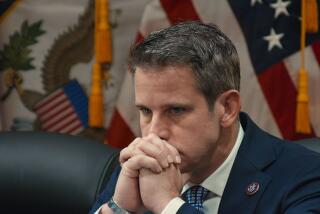ORANGE COUNTY AND THE GULF WAR : Kissinger Wouldn’t Demand Hussein’s Ouster : Peace terms: The former secretary of state says the Iraqis themselves will probably get rid of their leader because of his failures against Iran and the U.S.
- Share via
IRVINE — Former Secretary of State Henry A. Kissinger said Wednesday night that he does not think the United States should require the overthrow of Iraqi President Saddam Hussein as a condition of ending the Persian Gulf War.
“I would not make his overthrow a direct objective of American policy,” Kissinger said, adding that Hussein is likely to be ousted by the Iraqis themselves because of having fought a futile eight-year war with Iran and now having engaged in a losing war with United States and its allies.
“He would have fought a war that wrecked the infrastructure of Iraq--all its recent scientific and military progress--and again he would be worse off . . . ,” Kissinger said. “If he cannot be replaced under those circumstances, you wonder about the sanity of the leading groups in Iraq.”
When peace comes, Kissinger said, the United States and its allies should demand that Iraq “leave its heavy equipment behind in Kuwait.” The peace settlement should also demand a “demilitarized belt of some agreed distance, say, 25 to 35 miles” separating the Kuwait-Iraq border.
Kissinger spoke to reporters at the Hyatt Regency Irvine before giving a speech to the annual dinner of the Industrial League of Orange County.
Kissinger, 67, served as President Nixon’s adviser during much of the Vietnam War, and he served as secretary of state from 1973 to 1977, under Nixon and during the subsequent administration of President Gerald R. Ford. He won the Nobel Peace Prize in 1973.
The graying, solemn Kissinger made it clear during Wednesday night’s press conference that he does not favor an attempt by the United States to march into Iraq after liberating Kuwait.
“I would not like to see an American army march on Baghdad and occupy major Iraqi cities in order to replace an Iraqi leader in a country in which, since 1958, every succeeding government has been more murderous than its previous system,” Kissinger said.
Kissinger said he thinks the war is nearing an end.
“I actually think the war is going to end within the next few weeks,” whether as a result of a negotiated settlement or a land war, he said.
Noting that Iraq recently made an offer to leave Kuwait if a number of conditions were met, Kissinger said, “I don’t believe these offers would have been made in whatever condition or form if the Iraqi military were not in a very desperate situation.”
In response to a question, Kissinger said he does not think the United States should help rebuild Iraq after the war.
“No,” he said flatly. “We (in the United States) have sort of a standard attitude that while we’re bombing a place, we announce that we’re going to help its reconstruction. We did that in Vietnam in 1965, and it didn’t have any huge impact. Iraq is a rich country. It has a lot of oil. It is responsible for this war, and it should pay for its own recovery.”
When asked about Israel and its relation to the war, Kissinger said: “I must say I have personally expected that Israel would not let the war end without showing that to attack Israel you get punished very severely.
“On the other hand, it is very hard to imagine what they can do that our Air Force has not already done. Will they therefore do some ground action? I can’t speculate. But I can’t imagine an air operation that would add significantly to what we have already done.”
More to Read
Sign up for Essential California
The most important California stories and recommendations in your inbox every morning.
You may occasionally receive promotional content from the Los Angeles Times.










